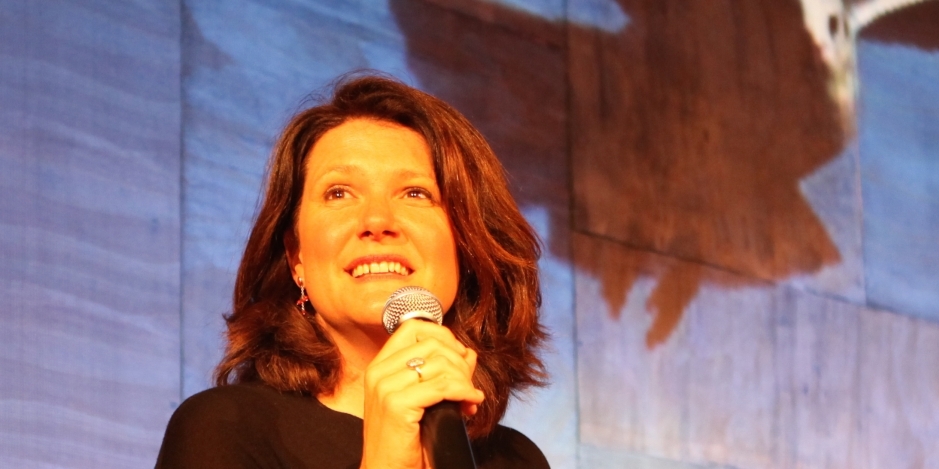
Having given Kate five stars for her last appearance at the Tobacco Factory for the excellent Beware of Young Girls, the story of Dory Previn, I was looking forward to hearing her perform her autobiographical show Songbirds, for which she has already received wide praise. Tom Robinson of BBC Radio 6 Music has described one of her tracks, Musical Boxes, as a stunner, and a favourable review by Clive Davis has appeared in the Times. A number of songs from the album Songbirds were featured as the backing track for Chocolate Films’ Century: 10 Women 10 Decades – a piece devoted to celebrating women in London and what it is like to be a woman in the city.
Kate has an easy confidence on stage and when engaging her audience. Since singing with an all-female close harmony group at school, which won the TV talent contest Sky Star Search in 1990, and later going on the alternative cabaret circuit, Kate has steadily built a reputation as a performer, touring first Peggy Lee and later Dory Previn tribute acts. With Songbirds she is taking the first steps as a singer-songwriter in her own right. Inevitably, perhaps, there are glimpses of Lee and Previn within Dimbleby’s material, but Kate, like all of us, has a very personal story of her own to tell, which can fluctuate from quiet and pained to loud and exuberant.
The performance of Songbirds is as much about the storytelling as it is the delivery of the songs, which, with a few exceptions, are quite short. We hear about growing up in the Dimbleby household, operatic breakfasts for instance, and a reverence for granddad Richard, of whom we hear a recorded clip. There is the pain of a relationship breakdown (Limbo), the silence of a visit to Vancouver Island (Love Can Be Easy) and later the escape from a bear. There is a hilarious re-enacting of her experiences of giving birth, and the soundtrack to accompany it. She covers a trip to the States where she submits herself to the guidance of Bobby McFerrin (of Don’t Worry Be Happy fame), leading to a sense of arrival, where she seeks out her own voice for the first time (Musical Boxes and At Our Best).
Working acapella, Kate uses a multi-track voice looper to build layers of backing vocals. The looper sits modestly atop an ironing board along with a couple of effects pedals. Behind, a large backstage screen has occasional stills and video projected onto it. One of Kate’s strengths is that nothing seems to phase her during live performance. If anything goes wrong, such as pressing the wrong looper button, or grappling with a volume control mid-song, well, what the hell! Let’s just get on with it!
Commendable as it was to build up the songs from scratch on the machine, inevitably there was a loss of connection with the audience because of it, demanding as it does, constant twiddling or pressing to create, sustain or mute tracks. Endings could be sudden, abruptly stopping like any other electrical implement would do without power. While Kate is a natural harmoniser, the looper can offer no change of direction or tempo once set, no middle eights or mood swings, rendering some of the pieces more as musical templates than complete works. In the second half, Kate was joined by local blues harpist Keith Warmington, who injected an expressive, intuitive human touch into the music making.
I personally much preferred Kate’s more introspective numbers – Limbo and Musical Boxes being the standouts for me. Her attempts to whip up the audience (Happy) left me cold, but might have fallen more happily on the ears of a less cynical reviewer than this one! Singing out the letters B-R-I-S-T-O-L felt uncomfortably cringeworthy, especially so early in the set. Her attempts (as a trained Alexander technique practitioner) to read the back of an anorak-wearing audience member for ‘his’ song also fell flat.
I sense we have yet to hear and see the best from Dimbleby. Songbirds represents a first experiment with her own sounds, lyrics and stagecraft. My hunch is that the looper would be best left at home, or set as a preset backing track, leaving Dimbleby to do what she does best – engage an audience without distractions, from the front of stage. ★★★☆☆ Simon Bishop 1st May 2017

